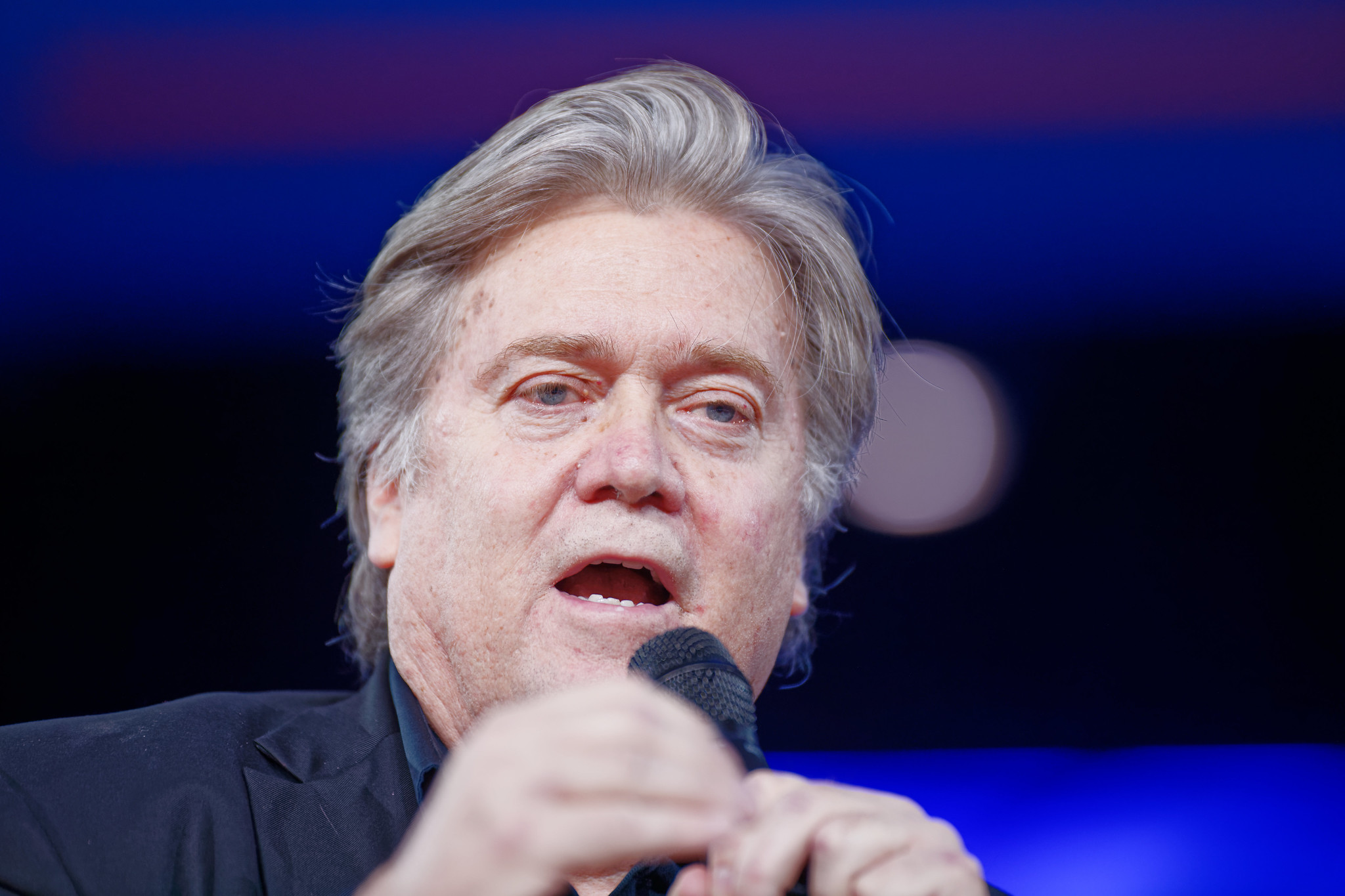Why the Justice Department Is Taking So Long to Indict Steve Bannon
The contempt case against Bannon is actually more complicated than it looks.

Published by The Lawfare Institute
in Cooperation With

Attorney General Merrick Garland is frustrating a lot of people. Congress held Steve Bannon in contempt fully three weeks ago, and the Justice Department still has not yet indicted him. Over at Vanity Fair, Eric Lutz frets that Garland is “setting a dangerous precedent” by taking so long to spring the trap:
subpoenas only have teeth if the Garland DOJ proves willing to enforce them. “If Merrick Garland does not prosecute Steve Bannon, all these other witnesses...they are going to have no deterrent either and they are going to see it as a free-for-all to do what they will,” as CNN legal analyst Elie Honig put it. “So there is a lot riding on what Merrick Garland decides to do here.” Discussing the subpoenas Tuesday on MSNBC’s Morning Joe, co-host Joe Scarborough said he was “a little bit confused by exactly what Merrick Garland is doing.”
Such exasperation over the Justice Department’s handling of Bannon seems widespread. Congress has acted, after all. The Justice Department is under an apparent legal obligation to put such matters before a grand jury. The facts are not in serious dispute: Bannon is defying a subpoena. Why hasn’t the indictment happened yet?
The answer will disappoint many people who are eager to see Bannon prosecuted: The question before the Justice Department that his case presents is not, in fact, a simple one. It’s a complicated, nuanced question with a variety of components that the Justice Department needs to work through. We discussed the complexity of the Bannon case at length in a recent episode of the Lawfare Podcast:
And as a kind of guide to the situation, we summarize here the major difficulties the Bannon case presents for an actual prosecutor who is actually part of the real, live executive branch—a branch of government with interests and views of the law that have been codified over long periods of time.
Bannon’s claim that executive privilege prevents his testimony has faced a great deal of ridicule. Donald Trump, as a federal judge put it yesterday, is “not president,” and the current president has not asserted privilege over Bannon’s testimony. Bannon was not even an executive branch official at the relevant time, and the privilege—whatever its true contours—cannot cover podcast hosts. And Bannon has refused even to show up for testimony in response to the subpoena. Executive privilege does not excuse a witness from appearing in the first place; it merely protects testimony. The witness has to show up and assert privilege in response to specific questions.
The trouble for the Justice Department is that each of the elements of Bannon’s claim has some degree of precedent in the Justice Department’s own positions. This does not mean those positions are correct understandings of the law; they almost certainly are not. It also doesn’t mean the Justice Department would necessarily back Bannon’s invocation of the privilege in this context.
But critically, the question for a prosecutor deciding whether or not to charge Bannon with a crime is not whether Bannon’s interpretation of the law is correct or not. It is whether the department can prove to a unanimous jury beyond a reasonable doubt that Bannon did not believe his assertion of privilege to be credible. After all, it is not inappropriately stubborn conduct to refuse to testify in the presence of a valid assertion of privilege. The burden is thus on the prosecution to prove that Bannon could not in good faith believe his assertion of privilege to be valid.
This would be easy if it were completely obvious that each of the components of Bannon’s claim were frivolous. But as we noted above, the executive branch takes an expansive view of the privilege and has presaged each component of Bannon’s argument in opinions of its own.
For example, on the matter of showing up, the Office of Legal Counsel (OLC) has opined that a close presidential adviser does not need to show up in response to a congressional subpoena because such advisers are immune from compelled congressional testimony. That doctrine has—to date—been applied only to presidential advisers who are in official positions in the White House. But Bannon may seek an extension of it. During the Trump administration, OLC also developed other new grounds for refusing presidential advisers even to appear in response to a subpoena, concluding that congressional subpoenas that did not allow a Justice Department attorney to accompany an executive branch official were “legally invalid” and could simply be ignored. Thus, Bannon may rely on some of the Justice Department’s own precedents to support his refusal to show up. The department is undoubtedly considering any arguments he raises carefully before proceeding with prosecution.
As to whether the privilege can extend to former presidents, there’s law on that point from the Supreme Court. And the relevant case, Nixon v. Administrator of General Services, is relatively favorable to former presidents. In it, the court recognized an authority in former presidents to “assert” executive privilege, though it also gave precedence to the views of the incumbent president. Many people want to reject a former president’s authority to assert executive privilege out of hand, and that is a reasonable interpretation of the Constitution given that executive privilege is, in essence, an inherent constitutional authority belonging to the current head of the executive branch. But the Justice Department cannot simply ignore the Supreme Court’s statement. In a criminal prosecution, it must prove beyond a reasonable doubt that Bannon had no viable defense, even given the broad language of the Nixon case.
And as to whether the privilege can extend to private individuals, the Justice Department has previously opined that executive privilege does cover conversations between the president and individuals outside the executive branch. The rationale for protecting the president’s conversations with advisers is the need to ensure advisers speak with candor and without fear of the public reaction. And in the Justice Department’s view, that applies equally to advisers who do not have official positions but may be advising the president about his official duties. Again, that position is not without controversy, and many people reasonably take a different view. But the Justice Department cannot ignore it.
What’s more, it’s typical in situations like this one for a preindictment dialogue to take place between the Justice Department and defense lawyers, and for the defense to presage some of its arguments. So it’s useful to imagine a back-room dialogue in which Bannon’s counsel have supplemented these points with arguments of their own that may not be obvious from the public record.
The result is that the question facing the Justice Department is not the simple one that people seem to imagine—in which the department’s only equity is supporting Congress’s subpoena authority in the face of intransigent witnesses. The question, rather, is whether it’s possible to use the criminal process to do this without compromising traditional executive branch views of its own authority and in a fashion that can be proved to a jury under the exacting standards of the criminal law. Ambiguity in the law is endemic to disputes between Congress and the executive branch over their respective constitutional authorities. But that ambiguity is anathema to criminal prosecution. Individual citizens must have notice of what the law is before they can be prosecuted for violating it, and the Justice Department must prove each element of its case without any ambiguity.
Prosecuting Bannon, who is following a direction from a former president in an area with little legal clarity, is not an easy question. It thus makes some sense that the Justice Department has taken three weeks to consult and work through the questions it presents.
All of which is not to say that the department should not indict and prosecute Bannon—or to predict that it ultimately will not. As we discuss in the podcast, there are ways to reason around the precedents, some of them quite compelling. For example, the department could simply take the view that executive privilege is not designed to cover up wrongdoing, and the entire Jan. 6 episode implicates such wrongdoing and not the deliberative policy advice the privilege is concerned with protecting. It could also take the view that while each component of Bannon’s argument has some precedent, the amalgamation of them has none and veers so extravagantly into uncharted waters that nobody could seriously entertain the notion that the privilege extends so far.
One of us has also pointed out that Congress itself could easily resolve this issue, by narrowing the subpoena to material not covered by executive privilege. Executive privilege covers only conversations related to the president’s official duties, not his political or personal activities. By narrowing the scope of the subpoena to Bannon such that it covered not official duties but only conversations about Trump’s personal and political duties, the committee could eliminate any possibility that privilege would apply. That would render irrelevant the previous executive branch precedents on privilege and make the department’s job a great deal easier.
Our point is simply that commentators are not fully appreciating the Justice Department’s conduct here, having caricatured the decision that prosecutors face. Even if the frustration by inaction is borne out of disagreement and a desire that the Justice Department repudiate some of its more expansive past precedents—or at least not extend them to cover Bannon—the desire for haste should be tempered. The Justice Department’s taking its time to review its own precedents before reaching a decision and to consider all the consequences of its actions before bringing criminal charges is a good thing. Achieving outrage by defining a problem as trivial and then denouncing inaction is too easy. The Bannon case is a hard one. If the Justice Department wants to take a few more weeks to work on it, the Jan. 6 committee has a lot of other work to do in the meantime.






